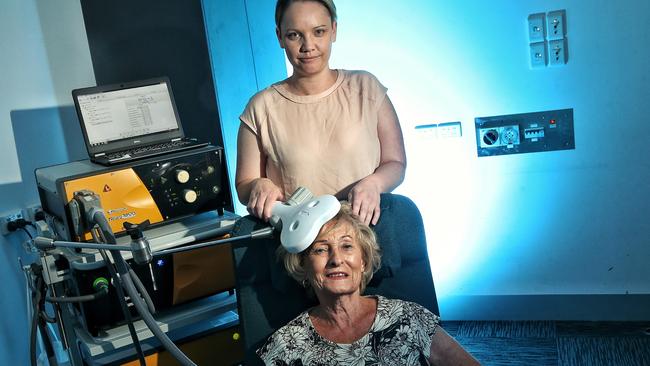Magnets to manipulate brain activity latest therapy to improve early symptoms of Alzheimer’s disease
A NON-INVASIVE therapy that rests magnets on the head to manipulate brain activity is the latest treatment being trialled in Melbourne to improve early symptoms of Alzheimer’s disease.

VIC News
Don't miss out on the headlines from VIC News. Followed categories will be added to My News.
A NON-INVASIVE therapy that rests magnets on the head to manipulate brain activity, is the latest treatment being trialled to improve early symptoms of Alzheimer’s disease.
And some elderly patients already reporting improvements in their memory and concentration in the world-first trial.
The Monash Alfred Psychiatry Research Centre has been trialling Transcranial Magnetic Stimulation (TMS) for use in depression and schizophrenia, using the focused magnetic field to stimulate nerve cells in the surface areas of the brain.
MAPrc group leader Associate Professor Kate Hoy said they were encouraged by regular phone calls from willing participants to study the technique in early-stage Alzheimer’s disease, to add weight to research into TMS overseas.
Associate Prof Hoy said they were using a new type of TMS called Theta-burst stimulation, allowing them to deliver shorter stimuli at higher frequency to the four main brain areas involved in the disease in just three minutes, compared to the standard 40-minute treatment targeting one brain region.
She said the treatment worked by targeting the build-up of plaque proteins around brain cells, which weakened the way these neurons communicated with each other.
“How well our brain cells talk to each other is what underlies how we think, our information processing and our memory,” Associate Prof Hoy said.
“We’re targeting the regions that are affected in this way and trying to increase their ability to talk to each other by strengthening their connections.”
They are aiming to recruit 100 people with mild to moderate Alzheimer’s disease for the six week trial.
It wasn’t just Jo Duff’s cognitive test scores that improved over the six week trial, but both she and those close to the 78-year-old saw a noticeable difference in her thinking and ability to remember things around the house she had previously struggled to recall.
“I was much clearer in my thinking. I could express myself a lot better,” Mrs Duff said.
“Alzheimer’s gives you a foggy feeling in the brain, but that lifted. It felt just like someone tapping my forehead.”
People aged 50-95 years who have been diagnosed with mild to moderate Alzheimer’s disease are needed for the study. Details: 9076 9864.


